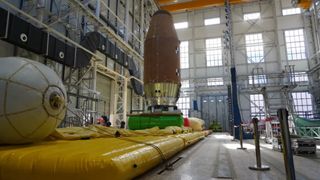China prepares to launch yet another new solid rocket, the Smart Dragon 3
The country has developed a variety of solid-fueled launch vehicles.

China is continuing to boost its options for launching small satellites with a new rocket called the Smart Dragon 3, which is expected to fly for the first time soon.
Smart Dragon 3, also known as Jielong 3, last week successfully passed payload fairing separation tests and has now entered the flight test phase for its first mission, according to its developer, China Rocket Co. Ltd.
Smart Dragon 3 will be capable of sending 3,300 pounds (1,500 kilograms) of payload to a 310-mile-high (500 kilometers) sun synchronous orbit.
Related: The latest news about China's space program
The "cost-effective and highly adaptable" rocket will also be capable of launching up to 20 satellites at a time, according to Chinese state media outlet Xinhua.
China Rocket Co. Ltd. is a spinoff from the China Academy of Launch Vehicle Technology (CALT), and the four-stage solid-propellant Smart Dragon 3 will be used to launch satellites for commercial customers.
Curiously, the rocket resembles in both appearance and capabilities the recently debuted Lijian 1 rocket, from CAS Space, which sent six satellites into orbit with its first flight on July 27. The pair are the most powerful solid rockets for orbital launches that China has developed so far.
Get the Space.com Newsletter
Breaking space news, the latest updates on rocket launches, skywatching events and more!
China Rocket's parent company CALT is one of two major launch vehicle makers under the state-owned China Aerospace Science and Technology Corporation (CASC), the country's main space contractor.
CALT developed the Long March 11 solid rocket, which debuted in 2015 and has now launched 13 times — all successfully — from both land and sea.
Galactic Energy and iSpace are two among a number of private Chinese firms that also operate solid rockets for launching commercial satellites, while Expace, a spinoff from another big Chinese defense contractor, CASIC, operates the Kuaizhou solid rocket series.
"It seems to me there is a clear belief that these new vehicles, because of their inherent characteristics as solid-fueled launchers, will reply to important needs of China's and international space sectors," Tomas Hrozensky, a researcher at the European Space Policy Institute, told SpaceNews in March.
Follow us on Twitter @Spacedotcom or on Facebook.
Join our Space Forums to keep talking space on the latest missions, night sky and more! And if you have a news tip, correction or comment, let us know at: community@space.com.

Andrew is a freelance space journalist with a focus on reporting on China's rapidly growing space sector. He began writing for Space.com in 2019 and writes for SpaceNews, IEEE Spectrum, National Geographic, Sky & Telescope, New Scientist and others. Andrew first caught the space bug when, as a youngster, he saw Voyager images of other worlds in our solar system for the first time. Away from space, Andrew enjoys trail running in the forests of Finland. You can follow him on Twitter @AJ_FI.
